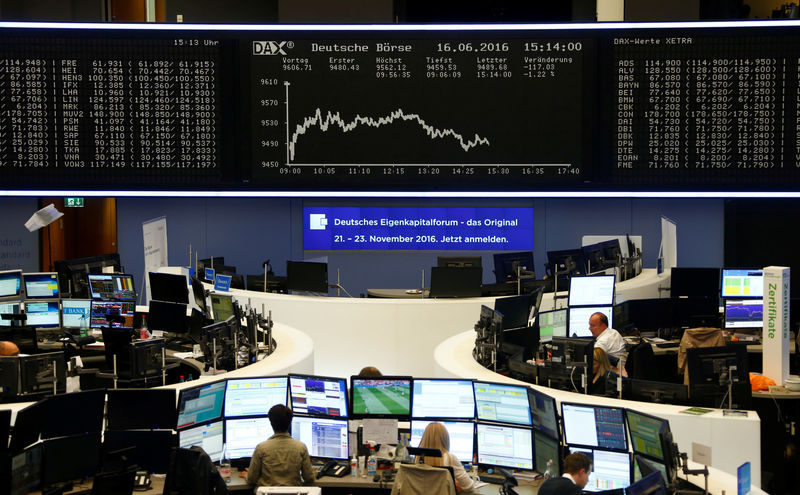By Tom Wilson
LONDON (Reuters) - Stock markets slumped on Wednesday as Germany's economy went into reverse, fueling fears of global recession and slamming the brakes on a rally for equities after Washington delayed tariffs on some Chinese imports.
Europe's biggest economy shrank 0.1% in the second quarter as the trade war and weak demand dragged on German manufacturers. The euro zone as a whole barely grew in the same quarter, with the 19-country bloc adding 0.2% - a slowdown from the first three months of the year.
The Euro STOXX 600 (STOXX) fell 1%. Markets in London (FTSE), Frankfurt (GDAXI) and Paris (FCHI) lost between 0.8% and 1.5%. Wall Street futures gauges were also indicating losses of around 0.7%.
The MSCI world equity index , which tracks shares in 47 countries, lost 0.2%, surrendering by late morning its earlier gains. Bond markets, too, were flashing warning signals of recession.
The gap between U.S. two-year and 10-year Treasury yields - a metric closely watched for signs of a slowdown - inverted for the first time since 2007, raising the specter of a global recession.
(GRAPHIC - Bonds: https://tmsnrt.rs/2YN5XYj)
"The telling thing is that there is a delayed effect - traditionally you see a one-to-two-year lag before a recession. You could see it next year," said Neil Wilson, chief markets analyst at Markets.com.
"The fact that 2s10s has also gone this way is a massive red warning light for the U.S. economy," he said, referring to the inverted yield of U.S. Treasuries.
The gap between UK two- and 10-year bonds also inverted for the first time in over a decade, while U.S. 30-year bonds and German 10-year bunds fell to record lows.
The German figures - along with data showing the slowest growth for Chinese industrial output in 17 years that indicated faltering demand in the world's second-largest economy - knocked the wind out the sails for stocks and gave rise to the angst over a slowdown.
Equity investors on Wall Street and in Asia had cheered earlier when U.S. President Donald Trump pushed back to December a Sept. 1 deadline for new tariffs on remaining Chinese imports.
The S&P 500 (SPX), which had fallen 1% on Monday, rose 1.5% overnight, buoying Asian stocks outside Japan by 0.5%. Benchmarks in Shanghai, Hong Kong, Tokyo and Seoul all mirrored the surge in U.S. stocks.
But the momentum ebbed in Europe, as optimism faded that Trump's move meant tensions were easing and Germany's slowdown showed the damage already done by the trade war.
"The trade war and the dispute between U.S. and China has already had an impact - especially when you look at countries most sensitive to global trade like Germany and even Italy," said Christophe Barraud, chief economist and strategist at Market Securities in Paris.
In another sign the trade dispute is hampering growth, China's industrial output slowed more than expected in July. Its 4.8% growth was the lowest since February 2002.
The Japanese yen
Mirroring that view, the offshore Chinese yuan
(GRAPHIC - China industrial output: https://tmsnrt.rs/2YOpAiC)
In commodity markets, oil prices fell after the Chinese data from China and a rise in U.S. crude inventories, erasing some of the gains made after Trump's tariff delay.
Brent crude was down 80 cents, or 1.4%, at $60.47 a barrel at 1053 GMT, after rising 4.7% on Tuesday, its biggest percentage gain since December.

For Reuters Live Markets blog on European and UK stock markets, please click on: [LIVE/]